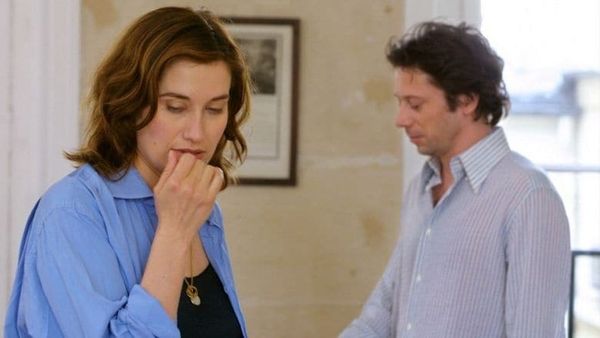Eye For Film >> Movies >> Kings And Queen (2004) Film Review

Nora (Emmanuelle Devos) has unresolved feelings towards her father Louis (Maurice Garrel), who is rapidly dying of cancer, and towards her first husband Pierre (Joachim Salinger), who died before the birth of their son Elias (Valentin Lelong) 10 years ago. Now about to marry again, but aware Elias cannot stand her new fiance, Nora turns for help to the most unlikely source, her former lover Ismael (Mathieu Amalric).
Not that the erratic musician Ismael lacks problems of his own. He has huge debts; the IRS is aggressively pursuing him; he has recently been taken against his will to a psychiatric hospital and neither his drug-addled attorney (Hippolyte Girardot), nor the hospital psychiatrist (Catherine Deneueve), seem so convinced that staying there for a while need be such a bad thing. As Ismael tries to discover who had him committed and to work out his true feelings for fellow inmate Arielle (Magali Woch), it becomes clear that both he and Nora have some growing up to do.

It is easy to understand why Nora and Ismael separated a year before the principal events of Arnaud Desplechin's Kings And Queen, as they are like chalk and cheese, worlds apart in terms of their class, philosophy and social adjustment. Yet, even though they share the screen only twice - plus a brief flashback - during the course of the film, what links them closely and lends unity to their narratives is a common childish self-absorption that cocoons both from reality. The one-time couple are convinced of their fate as victims, but blind to the effects of their narcissistic behaviour on themselves and others, until they each receive brutally frank critiques from somebody too close simply to ignore.
Desplechin tells these parallel stories in contrasting genres, playing off Nora's tragedy against Ismael's comedy, so that Kings And Queen is not unlike Woody Allen's Melinda And Melinda, only far more subtle and less broadly slapstick. All this introduces an interesting imbalance in characterisation. Nora and Ismael exhibit essentially the same self-regard and irresponsibility towards others, but the filter of comedy makes Ismael's flaws seem lovable (Amalric plays him with roguish glee), whereas the melodramatic frame for Nora's experiences leaves her looking more morbidly reprehensible (Devos does not shrink from the cold superficiality of the part). There is no doubt that, for whatever reason, Desplechin is far more generous in the presentation of his male lead, but on reflection, both characters need, as well as deserve, the shake-up that they get and neither would seem entirely out of place in an asylum.
Kings And Queen is a complex, character-driven film, which is to say that it never allows its themes - madness, love, coming of age - to become reducible to pat formulae, or over-sentimentalisation. Despite its considerable length, it avoids overstaying its welcome through believable observations, good humour and plenty of cliche-trouncing surprises, not least in its final sequence where the previously feckless Ismael proffers considerate, tactful advice to Elias, and proves himself most fatherly precisely by rejecting the status of fatherhood.
In the end, Kings And Queen turns out to be an exploration of the ties, family or otherwise, that bind us together and define who we are.
Reviewed on: 14 Dec 2005


















